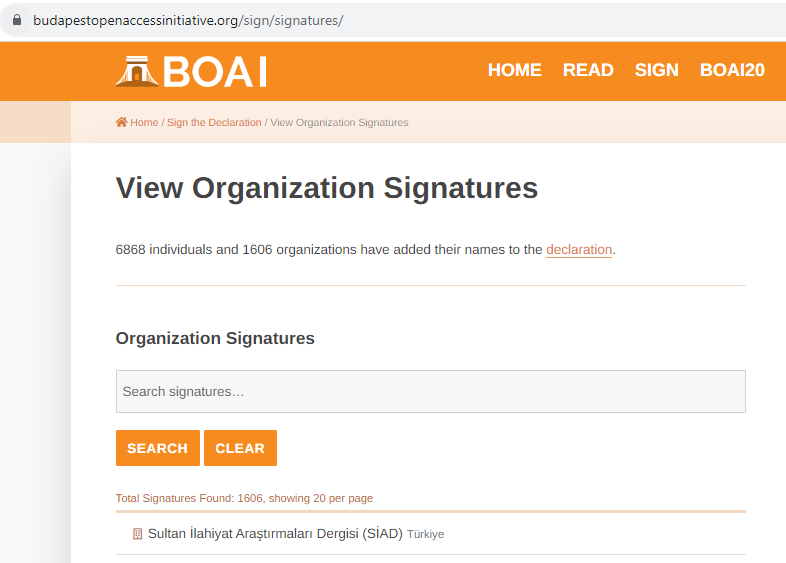Open Access Policy

SULTAN JOURNAL OF THEOLOGY RESEARCH (SİAD) SIGNED THE BUDAPEST OPEN ACCESS INITIATIVE DECLARATION (BOAI) ON 08.10.2023.
All issues of SULTAN JOURNAL OF THEOLOGY RESEARCH (SİAD), which adopts the principle of making scientific knowledge available to users in open access, will be accessible online in accordance with the open access policies of the Budapest Open Access Initiative as stated below.
https://www.budapestopenaccessinitiative.org/read/turkish-translation/
Sultan Journal of Theological Studies, in its board meeting dated 01.10.2023, decided that all content of the journal published from the first issue should be open access. As a result of this decision, copyright and license terms now apply to all published content.
Sultan Journal of Theological Studies signed the Budapest Open Access Declaration on 08.10.2023.
http://www.budapestopenaccessinitiative.org/list_signatures/
https://www.budapestopenaccessinitiative.org/translations/turkish-translation
Open Access encompasses both Gratis and Libre Open Access. Over twenty years ago, Open Access referred to content provided free of charge without any additional cost. This form of Open Access is now referred to as Gratis Open Access. As the concept of Open Access has gained broader acceptance over time, there has been a growing need for clarity regarding what users are permitted to do with the content. This necessitates clear articulation of user rights. Gratis Open Access removes price barriers but still retains certain permission restrictions, and is thus referred to as Libre Open Access. Libre Open Access allows for various levels of reuse, such as commercial use, creation of translations, etc., as specified under different Creative Commons licenses.
Publishers believe that for Open Access to function effectively, user rights and copyright ownership must be explicitly clear through licensing.
The journal's open access articles are licensed as CC BY-NC 4.0 ATTRIBUTION-NONCOMMERCIAL 4.0 INTERNATIONAL Deed.
Creative Commons Attribution-NonCommercial 4.0 International (CC BY-NC 4.0) License permits the sharing, copying, reproduction, and adaptation of the work in any format and medium, as long as it is not for commercial purposes, and as long as appropriate attribution is given to the original work. This includes remixing, transforming, and building upon the work, provided that it is done in a manner consistent with the license terms. As long as the license conditions are met, the licensor cannot revoke these freedoms.
Under this license, you are free to:
-
Share: Copy and redistribute the work in any medium or format. This allows for the broad dissemination of the work.
-
Adapt: Remix, transform, and build upon the work. This facilitates creative and innovative development of the work.
However, you must comply with the following terms:
-
Attribution: You must provide appropriate credit, provide a link to the license, and indicate if changes were made. You may do so in any reasonable manner, but not in any way that suggests the licensor endorses you or your use.
-
NonCommercial: You may not use the material for commercial purposes. This means you cannot use the work in any way that is primarily intended for commercial advantage or monetary compensation.
No Additional Restrictions: You may not apply legal terms or technological measures that legally restrict others from doing anything the license permits. This means that the permissions granted by the license cannot be restricted by legal conditions or technological protection measures.
Articles published in this journal are digitally archived in OpenAIRE. OpenAIRE has permission to collect, preserve and make available this access Archive Volume.
Articles published in our journal are licensed under CC BY-NC 4.0 ATTRIBUTION-NONCOMMERCIAL 4.0 INTERNATIONAL Deed.




